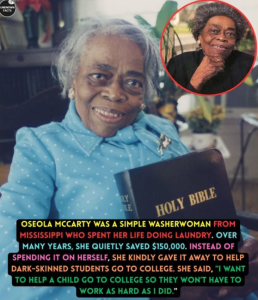Oseola McCarty: The Washerwoman Who Changed Lives With $150,000 Gift to Education
An inspiring 1000-word story of quiet sacrifice, purpose, and generosity
In a world often defined by flashy donations and loud acts of charity, one woman made history not with wealth or fame, but with simplicity, humility, and an unwavering commitment to giving. Her name was Oseola McCarty, a washerwoman from Hattiesburg, Mississippi, who spent her entire life doing laundry for others — and then stunned the nation by giving away nearly $150,000 to help young Black students get an education.
She had no press team, no business empire, no television interviews lined up. She lived modestly, worked quietly, and saved diligently. But when she donated the bulk of her life savings to the University of Southern Mississippi (USM), the world stopped to take notice. Oseola McCarty became an American hero.
The Humble Beginnings
Oseola McCarty was born in 1908 in Wayne County, Mississippi. She moved to Hattiesburg as a child and was raised primarily by her grandmother and aunt. Her formal education ended in the sixth grade. When her aunt fell ill, young Oseola left school to care for her. She never returned to the classroom — and never married or had children.
What she did instead was work.
For over 75 years, McCarty earned a living washing clothes by hand. Using a metal tub, scrub boards, and line-drying in the sun, she cleaned the garments of generations of families in her small community. She lived alone in a small house that had no air conditioning. She walked almost everywhere she went. She shopped with coupons and avoided unnecessary expenses. And all the while, she saved.
A Quiet Fortune
Despite her meager income, McCarty made it a habit to deposit part of every paycheck into a savings account. She said, “I didn’t buy things I didn’t need. The Lord helped me, and he’ll help you, too.” She didn’t own a car. She didn’t go out to eat. Her life was centered around church, work, and her small garden.
By the time she was in her 80s, her bank balance had quietly grown to $280,000. A bank officer at Trustmark Bank, astonished at her discipline and frugality, encouraged her to make a formal plan for her estate. That’s when Oseola made a decision that would change countless lives: she chose to give it away.
She left $150,000 — more than half of her total savings — to establish a scholarship at the University of Southern Mississippi. Specifically, she wanted it to help “needy African-American students who could not afford college.”
A National Sensation
The announcement of her gift in 1995 caught national attention. Journalists, talk show hosts, politicians, and celebrities were all astonished by the story: an elderly Black woman with no formal education, who made a living washing clothes, had amassed a small fortune and was donating it to send others to school.
She was celebrated widely:
-
President Bill Clinton awarded her the Presidential Citizens Medal, one of the highest honors a civilian can receive.
-
Harvard University, CNN, and Oprah Winfrey praised her on air and in print.
-
She appeared on The Today Show, became the subject of numerous profiles, and even had a children’s book written about her.
Despite the attention, McCarty remained modest and grounded. When asked why she gave the money away, she replied, “I’m too old to go to college. But I can help someone else go.”
More Than Money: A Legacy of Dignity
What made McCarty’s story so moving wasn’t just the money — it was her character. She didn’t just give; she lived with dignity, self-respect, and an unwavering belief in the value of education.
She never viewed her work as degrading. “Everyone needs a job to do,” she said. “Mine was to do laundry. I was proud of it.” And indeed, she brought pride to her craft. Families entrusted her with their finest clothes, and she returned them clean, pressed, and folded with care. She worked with integrity. She never sought shortcuts. And in the end, she transformed her labor into something powerful: a tool for lifting others up.
The Impact of Her Gift
The Oseola McCarty Scholarship Fund has since helped dozens of students attend the University of Southern Mississippi — and continues to do so today.
One of the first recipients, Stephanie Bullock, went on to become a teacher. “I owe my college education to Ms. McCarty,” she said. “She showed me what it means to give with your whole heart.”
Many of the students who received the scholarship said they felt a responsibility to honor Oseola’s gift by excelling academically and giving back to their communities.
Her example inspired other donors across the country — including some who had never considered philanthropy. Within months of her donation, the university received hundreds of thousands of dollars in matching gifts from others who were moved by her story.
End of Life and Ongoing Inspiration
Oseola McCarty passed away in 1999, at the age of 91, after being diagnosed with liver cancer. Her funeral was small and simple — just as she would have wanted. But the impact of her life continues to ripple.
Today, she is remembered not just for her generosity, but for her example of what true wealth means: not in dollars, but in discipline, faith, humility, and compassion.
Statues, scholarships, and school programs have been named in her honor. Her story is taught in ethics and economics classes around the country. And her name stands as a symbol of what’s possible when one person — no matter how humble their beginnings — chooses to act selflessly.
Closing Thoughts
In an age of viral fame, fast money, and public charity campaigns, Oseola McCarty’s legacy stands apart. She didn’t wait for applause. She didn’t announce her gift on social media. She simply lived with purpose, and when the time came, she gave what she had — and gave it with love.
“I can’t do everything,” she once said, “but I can do something to help somebody. And what I can do, I will do.”
And she did.

